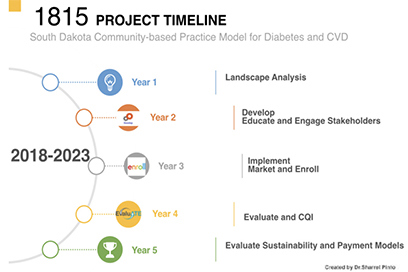 The South Dakota Department of Health’s Heart Disease and Stroke Prevention Program and Diabetes Prevention and Control Program have partnered with South Dakota State University on a five-year medication therapy management implementation and promotion project. By working with patient, practitioner, and payer stakeholder groups, the partnership creates a state-wide sustainable and financially viable community-based practice model that helps with the prevention and management of diabetes and cardiovascular disease.
The South Dakota Department of Health’s Heart Disease and Stroke Prevention Program and Diabetes Prevention and Control Program have partnered with South Dakota State University on a five-year medication therapy management implementation and promotion project. By working with patient, practitioner, and payer stakeholder groups, the partnership creates a state-wide sustainable and financially viable community-based practice model that helps with the prevention and management of diabetes and cardiovascular disease.
The work is part of the CDC-funded 1815 cooperative agreement focusing on promoting the adoption of MTM between pharmacists and physicians for the purpose of managing high blood pressure, high blood cholesterol, and lifestyle management and increasing engagement of pharmacists in the provision of medication management or DSMES (diabetes self-management education and support) for people with diabetes.
Medication Therapy Management Year by Year
In Year One, a landscape analysis was conducted to gain a better understanding of the current status of disease management and identifying gaps and facilitators in care.
Year Two focused on developing pharmacist service programs for patients with diabetes and cardiovascular disease (CVD), as well as expanding or completing some of the remaining Year One tasks as new information was discovered, or new organizations became interested in participating.
Webinars:
The Role of the Pharmacist in the Healthcare Team
Pharmacists are often underutilized healthcare professionals in many health delivery settings. This webinar explains the pre-licensure and ongoing training pharmacists receive to provide patient care. Examples of how pharmacists are currently assisting with outpatient clinic workflow in certain settings are also discussed.
Pharmacists & Health Home: A Discussion
This webinar provides a brief overview of the role and expertise of pharmacists while providing insight into how pharmacists can play a key role in serving Health Home patients. A diverse panel presents real-world examples of how Health Home practitioners can begin to incorporate pharmacists to assist in managing diabetes and cardiovascular disease.
Opportunities to Collaborate
MTM services have evolved substantially since the Medicare Modernization Act of 2003, commonly referred to as Medicare Part D. This webinar will detail existing options for providing MTM services to reach a larger number of patients in need as well as best practices for incorporating MTM into the existing workflow in a variety of settings such as community pharmacy, outpatient clinic, etc.
Posters:
- Improving Healthcare for South Dakotans with Diabetes and Cardiovascular Diseases: Practitioner's Outlook
- Why Rural Health? The Need for Pharmacy Transformation and Innovation in Rural America
- Improving the Health of South Dakotans through the Prevention and Management of Diabetes and Cardiovascular Disease (CVD): A Landscape Analysis – The Patient Journey
- Improving the Health of South Dakotans through the Prevention and Management of Diabetes and Cardiovascular Disease (CVD): A Landscape Analysis – The Payer Perspective
- Improving Awareness of Enhanced Pharmacy Services Among South Dakotans with Diabetes and Cardiovascular Disease: A Quality Improvement Innovation Project
Year Three of the five-year project to improve the prevention and management of patients with diabetes and cardiovascular disease (CVD) was a year of implementation of programs. Several programs were initiated, launched, and expanded throughout the year.
Year Four of the five-year project to improve the prevention and management of patients with diabetes and cardiovascular disease (CVD) was a year of continued implementation and evaluation. More programs were expanded and launched, quality improvement continued throughout the year, and evaluation of data collected throughout implementation began.
In Year 5, implementation and quality improvement continued, along with work to evaluate sustainability and payment models for services. All work completed was designed to meet the needs of our three stakeholder groups: patients, practitioners, and payers.
